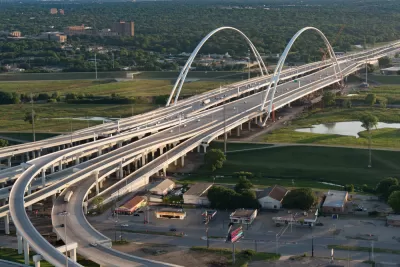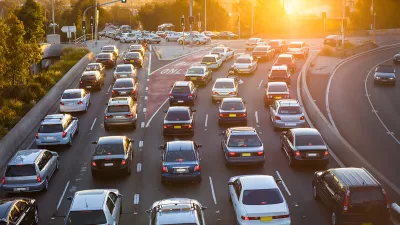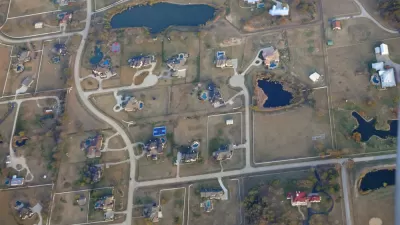The rapid economic growth of North Texas might not translate to economic mobility for many residents if the region can't better connect land use and transportation planning, according to this opinion piece.

Connor Harris, policy analyst at the Manhattan Institute and author of the recent report "Lone Star Slowdown? How Land-Use Regulation Threatens the Future of Texas," contributes a column on the subject of congestion in North Texas for the Dallas Morning News.
As noted by Harris, North Texas is quickly adding, over 100,000 new jobs between February 2018 and February 2019, and unemployment is below the national average. But with that growth comes challenges.
Land-use regulations in some established cities have pushed most of this growth out to the fringes of North Texas, in places like central and northern Collin and Denton counties, creating a serious transportation challenge. According to the consultancy INRIX, the average Dallas driver lost 76 hours every year to traffic congestion in 2018. And suburbs are developing in a way that leaves most people no choice but to drive everywhere — largely the result of regulations that require massive parking lots in every new development, making driving artificially cheap and walking unpleasant.
So travel times are increasing on average, even while travel distances are decreasing on average, and Harris sees reasons that congestion could slow economic mobility for the growing population. Harris's proposed solution: more zoning that allows for apartments in the region's suburbs, especially around DART stations. Still, according to Harris, all suburbs must have a role to overcome the challenges presented by its history of lad use regulations that only allow sprawling, single-family neighborhoods.
Housing prices will never moderate, though, unless suburban municipalities take a fresh look at their public policies. Zoning codes typically prohibit residential development in industrial and commercial zones, for example. Parking minimums, furthermore, require businesses to provide parking lots that can be several times larger than the stores they serve, as well as large amounts of parking — often two spaces per dwelling unit — in residential zones. The amount of land on which any residential development denser than single-family is prohibited, moreover, is almost certainly excessive.
FULL STORY: You can blame suburban zoning rules for your crushing commute

Planetizen Federal Action Tracker
A weekly monitor of how Trump’s orders and actions are impacting planners and planning in America.

Maui's Vacation Rental Debate Turns Ugly
Verbal attacks, misinformation campaigns and fistfights plague a high-stakes debate to convert thousands of vacation rentals into long-term housing.

Restaurant Patios Were a Pandemic Win — Why Were They so Hard to Keep?
Social distancing requirements and changes in travel patterns prompted cities to pilot new uses for street and sidewalk space. Then it got complicated.

In California Battle of Housing vs. Environment, Housing Just Won
A new state law significantly limits the power of CEQA, an environmental review law that served as a powerful tool for blocking new development.

Boulder Eliminates Parking Minimums Citywide
Officials estimate the cost of building a single underground parking space at up to $100,000.

Orange County, Florida Adopts Largest US “Sprawl Repair” Code
The ‘Orange Code’ seeks to rectify decades of sprawl-inducing, car-oriented development.
Urban Design for Planners 1: Software Tools
This six-course series explores essential urban design concepts using open source software and equips planners with the tools they need to participate fully in the urban design process.
Planning for Universal Design
Learn the tools for implementing Universal Design in planning regulations.
Heyer Gruel & Associates PA
JM Goldson LLC
Custer County Colorado
City of Camden Redevelopment Agency
City of Astoria
Transportation Research & Education Center (TREC) at Portland State University
Jefferson Parish Government
Camden Redevelopment Agency
City of Claremont





























